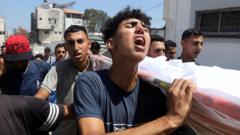In a tense backdrop of warfare, Russia announced a brief unilateral ceasefire, provoking mixed reactions from Ukraine and the international community.
"Putin's Easter Truce: A Fleeting Gesture or a Step Towards Peace?"

"Putin's Easter Truce: A Fleeting Gesture or a Step Towards Peace?"
Moscow's unilateral Easter truce raises questions about its sincerity amidst ongoing conflict.
In a surprising move, President Vladimir Putin declared a unilateral Easter ceasefire in Ukraine lasting until midnight on Sunday. Describing the action as “humanitarian,” the Kremlin faced skepticism from Ukraine, which viewed the short, 30-hour truce as a public relations stunt rather than a genuine step toward peace. President Volodymyr Zelensky highlighted ongoing military actions, suggesting the truce was more of a façade by Russia to foster an impression of commitment to peace.
The Russian defense ministry asserted adherence to the ceasefire, blaming Ukraine for any violations. Analysts speculate that the brief truce may serve Moscow's interests in repairing relations with the Trump administration, particularly given its lack of substantial progress in ongoing negotiations. Trump has signaled impatience with the Ukrainian situation and indicated a possible withdrawal from peace efforts if no advancement appears.
Nevertheless, the backdrop of increased international diplomacy offers a glimmer of hope. Recent engagements, including meetings involving Trump’s envoy, have sought to push for a resolution to the conflict. While the surprise announcement of a ceasefire may indicate potential openings for dialogue, the brief duration and lack of comprehensive planning raise doubts.
Could this fleeting truce evolve into a more meaningful cessation of hostilities? The situation remains fluid, yet the complexities underpinning the conflict suggest that true progress towards peace may still be out of reach. As the world watches, the possibility remains that behind-the-scenes negotiations could lead to unexpected developments in this strife-ridden region.
The Russian defense ministry asserted adherence to the ceasefire, blaming Ukraine for any violations. Analysts speculate that the brief truce may serve Moscow's interests in repairing relations with the Trump administration, particularly given its lack of substantial progress in ongoing negotiations. Trump has signaled impatience with the Ukrainian situation and indicated a possible withdrawal from peace efforts if no advancement appears.
Nevertheless, the backdrop of increased international diplomacy offers a glimmer of hope. Recent engagements, including meetings involving Trump’s envoy, have sought to push for a resolution to the conflict. While the surprise announcement of a ceasefire may indicate potential openings for dialogue, the brief duration and lack of comprehensive planning raise doubts.
Could this fleeting truce evolve into a more meaningful cessation of hostilities? The situation remains fluid, yet the complexities underpinning the conflict suggest that true progress towards peace may still be out of reach. As the world watches, the possibility remains that behind-the-scenes negotiations could lead to unexpected developments in this strife-ridden region.




















